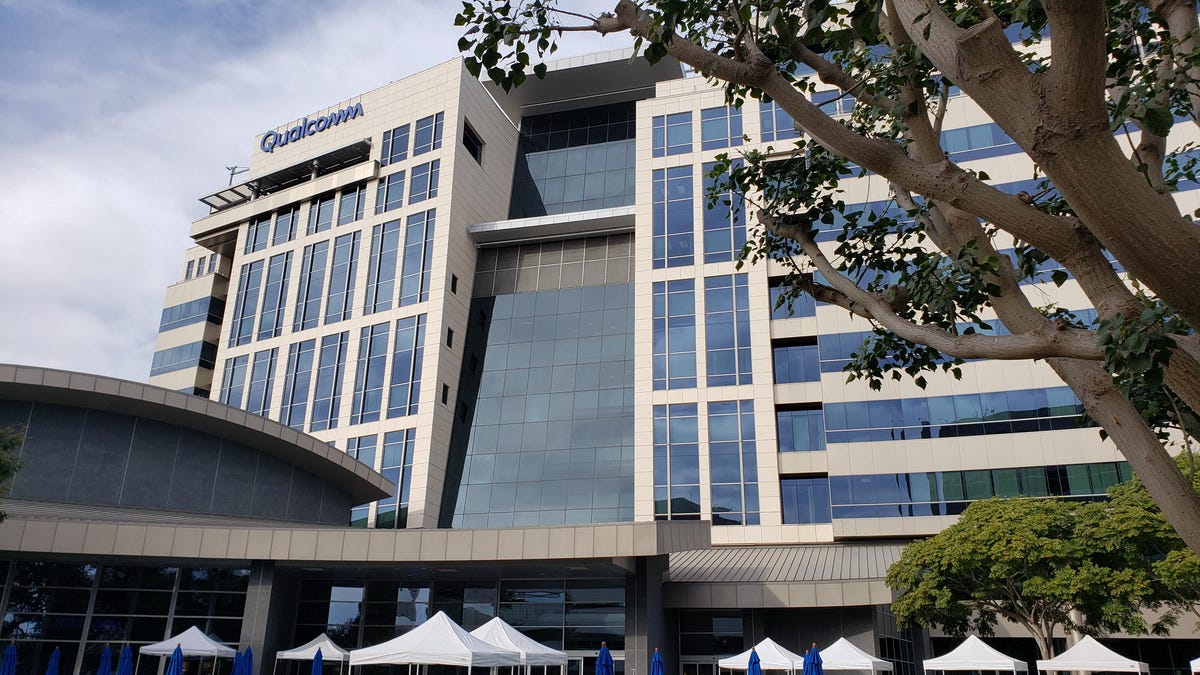Qualcomm and Apple kick off latest patent case
The case involves three Qualcomm patents covering technology used in some versions of the iPhone.

Qualcomm, based in San Diego, California, is one of the world's biggest mobile chipmakers.
Apple and Qualcomm kicked off the latest chapter in a long-running legal battle over patents and licensing agreements in the chipmaker's hometown of San Diego, California, on Monday.
Qualcomm, which supplies chips and modems for much of the mobile phone industry, says Apple infringed on three of its patents in some versions of the popular iPhone.
The chipmaker wants up to $1.41 per iPhone that infringed on its intellectual property sold during a certain period between 2017 and 2018. The exact figure was not disclosed, though it's estimated to be in the tens of millions of dollars or more. That sum would be a drop in the bucket for Apple -- which briefly became a $1 trillion company last year -- but a victory for Qualcomm would help to brandish its reputation as a mobile components innovator.
"Qualcomm, although it doesn't make a smartphone -- it doesn't have a product that you and I would buy -- it develops a lot of technology in smartphones ," David Nelson, the lead attorney representing Qualcomm, said in an opening statement on Monday.
The trial concerns three patents that Qualcomm claims Apple infringed on. One patent allows a smartphone to quickly connect to the internet once the device is turned on. Another deals with graphics processing and battery life. The third lets apps on your phone download data more easily by directing traffic between the apps processor and the modem.
During opening remarks, both sides zoomed in on the patent that focuses on boot-up technology when the phone is turned on. Nelson said the technology in the patent was "foundational" to the company's work, long before it was registered. Apple claims Qualcomm stole the idea for that innovation from then-Apple engineer Arjuna Siva, who the company said discussed the idea with Qualcomm engineers in an email.
"This one is truly the most outrageous allegation in the case," Juanita Brooks, lead counsel for Apple, said of the infringement claim in opening statements. "They took the idea from us and ran down to the patent office."
A long battle
The courtroom clash between Apple and Qualcomm is part of a wide-ranging legal saga. Two years ago, the Federal Trade Commission, aided by heavyweights including Apple and Intel, accused Qualcomm of operating a monopoly in modem chips. The agency argued Qualcomm's high royalty rates stopped competitors from entering the market, which has driven up the cost of phones and hurt consumers. That trial took place in January, and the parties are currently waiting for a decision from US District Judge Lucy Koh.
The San Diego trial, presided over by US District Judge Dana Sabraw, is more technical than the other fronts of the legal battle. But it could have implications on how your phone is made and how much it costs. The trial also sets the stage for an April meeting between the two companies over licensing deals. The two companies have been arguing over royalties Apple paid Qualcomm for licensing the chipmaker's technology. Apple paid $7.50 per iPhone, but Apple COO Jeff Williams testified in January that the price should have been a fifth of that price.
The iPhone was first introduced in 2007, but the company didn't start using Qualcomm chips for network connectivity until 2011. In 2016, the company started using Intel modems in some models of the iPhone 7 and 7 Plus. Now, Apple has opted for Intel's modems over Qualcomm's in all its latest phones.
'Eureka' and 'Maverick'
After opening statements on Monday, Qualcomm's first witness was James Thompson, the company's chief technologist. He described Qualcomm's relationship with Apple. He said the company typically began working on modems for an iPhone about four years before the phone would be released. "We defined the cellular component of that product," he said.
He also said both companies had nicknames for each other. Apple called Qualcomm "Eureka," and Qualcomm called Apple "Maverick."
A verdict in the San Diego trial, which will be decided by a jury of eight people, is expected in mid-March.
Originally published at 1:45 p.m. PT.
Update, 3:26 p.m. PT: Adds more detail from opening statements; and 4:25 p.m. PT: Adds more detail.

